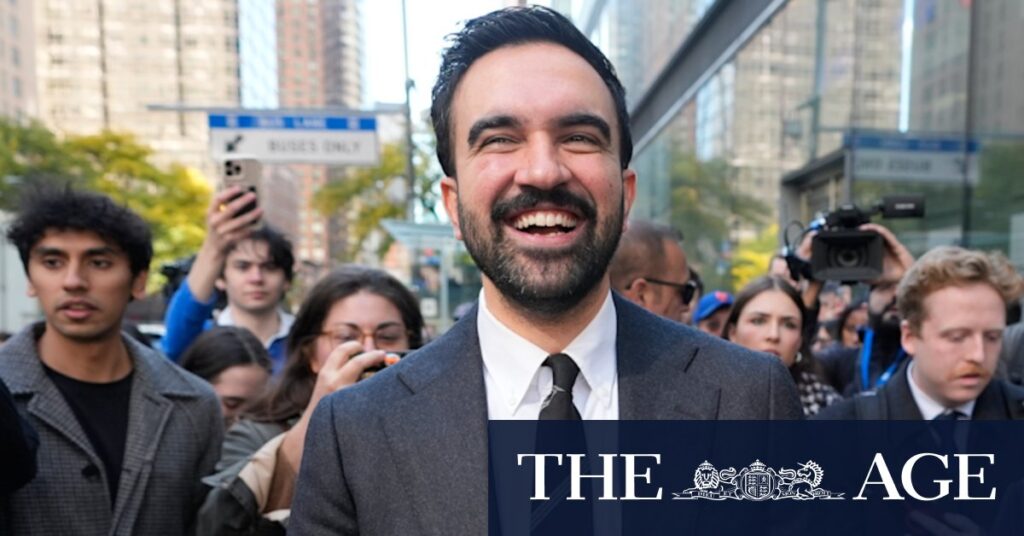
New York City finds itself on the brink of a historic mayoral election, with Zohran Mamdani poised to potentially become the first Muslim mayor of the city. The 34-year-old state assembly member, who won the Democratic primary in June with ease, has captured national and international attention. His campaign, characterized by its progressive policies and social media savviness, stands in stark contrast to the political norms of the past.
On the eve of Halloween, a vibrant gathering at a Brooklyn warehouse-style bar exemplified the grassroots enthusiasm surrounding Mamdani’s campaign. Organized by “Hot Girls For Zohran,” the event was more than just a festive celebration; it was a “party with purpose,” aimed at rallying support for Mamdani’s mayoral bid. Volunteers donned campaign shirts advocating for rent freezes and a $30 minimum wage, while QR codes facilitated sign-ups for door-knocking efforts.
Mamdani’s Rise and Political Stances
Mamdani’s ascent in politics has been meteoric, and his candidacy represents a significant shift in the political landscape. As a democratic socialist, he has drawn comparisons to figures like Bernie Sanders, and his platform includes ambitious proposals such as universal childcare, fare-free public transportation, and a rent freeze for millions of New Yorkers. However, his background and policies have also sparked controversy and polarized opinions.
Critics, including some Republicans, have questioned his citizenship due to his Ugandan birth and naturalization in 2018. Former President Donald Trump has labeled him a “100% Communist Lunatic,” threatening to withhold federal funding if Mamdani is elected. Despite these attacks, Mamdani’s support among young voters and progressives remains strong, positioning him as a potential catalyst for change within the Democratic Party.
Challenges and Criticism
Mamdani’s campaign has not been without its challenges. His previous support for the “defund the police” movement and remarks about Israel have drawn scrutiny, particularly in a city with a significant Jewish population. While he has moderated some of his positions, critics remain skeptical of his intentions. Conservative columnist Miranda Devine has expressed concern over Mamdani’s rise, attributing it to dissatisfaction with the Democratic establishment.
Polls indicate Mamdani holds a substantial lead over his closest rival, former New York governor Andrew Cuomo, who is running as an independent. Despite this, opposition from various quarters, including big business donors and conservative figures, continues to mount.
Economic and Social Implications
Mamdani’s economic proposals aim to address affordability issues that have plagued New York City, particularly in the wake of the COVID-19 pandemic. With median rents soaring to $3,600 for a one- or two-bedroom apartment, his policies seek to redistribute wealth by increasing taxes on the rich to fund services for the poor. The New York Times estimates these initiatives would cost around $7 billion annually, a figure Mamdani plans to cover through tax reforms.
“Rent freezes won’t reduce the cost of living for all but a select few New Yorkers and only temporarily,” said billionaire investor Bill Ackman, a vocal opponent of Mamdani’s policies.
Despite the criticism, Mamdani’s supporters argue that his policies are not radical but necessary responses to the city’s growing economic disparities. They emphasize that many of his proposals have precedents and are designed to improve the quality of life for working-class residents.
The Path Forward
As the election approaches, Mamdani’s campaign continues to galvanize support from diverse groups, including endorsements from prominent Democrats like Alexandria Ocasio-Cortez and Bernie Sanders. These endorsements underscore the broader implications of his potential victory for the Democratic Party and its future direction.
However, the road ahead is fraught with challenges. Should Mamdani win, his administration may face opposition from both state and federal levels, particularly if Trump follows through on his threats. Additionally, internal divisions within the Democratic Party could complicate efforts to implement his ambitious agenda.
Ultimately, Mamdani’s candidacy symbolizes a pivotal moment in New York City’s political history. As voters head to the polls, the outcome of this election could redefine the city’s identity and its role on the national stage. Observers and participants alike await the results with anticipation, recognizing that this election is about more than just choosing a mayor; it’s about shaping the future of New York City.







